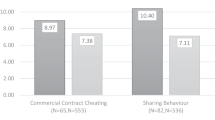Abstract
Some studies report high levels of perceived stress by university students in relation to academic misconduct [1]. Therefore, it seemed interesting to evaluate how and to what extent the social containment measures that have been put in place to mitigate the Covid-19 pandemic can influence the relationship between stress and ethical/unethical behaviors in the population of university students. 282 students from 3 Universities in Italy, filled in an online questionnaire aimed at detecting socio-demographic information, the level of perceived stress, the degree of interference between home life and study activities, the perception of unethical behavior. Results show a high level of stress and more serious issues with relationships with other students. In addition, problems in obtaining adequate online informational support appear to increase perceptions of misconduct during exams and in relationships with professors.
Access this chapter
Tax calculation will be finalised at checkout
Purchases are for personal use only
Similar content being viewed by others
References
Parlangeli, O., Palmitesta, P., Bracci, M., Marchigiani, E., Liston, P.M.: Stress misconduct and reduced ability to express dissent: a study on a sample of students at the University of Siena. In: Arezes, J.B.P.M. (ed.) Occupational Safety and Hygiene, pp. 443–446. CRC Press, Taylor & Francis Group, London (2018). eBook ISBN 9781351008884
Wang, C., et al.: Immediate psychological responses and associated factors during the initial stage of the 2019 coronavirus disease (COVID-19) epidemic among the general population in China. Int. J. Environ. Res. Public Health 17(5), 1729 (2020). https://doi.org/10.3390/ijerph17051729
Mukhtar, S.: Psychological impact of COVID-19 on older adults. Curr. Med. Res. Pract. 10(4), 201–202 (2020). https://doi.org/10.1016/j.cmrp.2020.07.016
Wagner, K.D.: Addressing the experience of children and adolescents during the COVID-19 pandemic. J. Clin. Psychiatry 81(3) (2020). https://doi.org/10.4088/JCP.20ED13394
Shah, K., Mann, S., Singh, R., Bangar, R., Kulkarni, R.: Impact of COVID-19 on the mental health of children and adolescents. Cureus 12(8) (2020). https://doi.org/10.7759/cureus.10051
Cao, W., et al.: The psychological impact of the COVID-19 epidemic on college students in China. Psychiatry Res. 287 (2020). https://doi.org/10.1016/j.psychres.2020.112934
Duan, L., Zhu, G.: Psychological interventions for people affected by the COVID-19 epidemic. Lancet Psychiatry 7(4), 300–302 (2020). https://doi.org/10.1016/S2215-0366(20)30073-0
Odriozola-González, P., Planchuelo-Gómez, Á., Irurtia, M.J., de Luis-García, R.: Psychological effects of the COVID-19 outbreak and lockdown among students and workers of a Spanish university. Psychiatry Res. 290 (2020). https://doi.org/10.1016/j.psychres.2020.113108
Xiao, C.: A novel approach of consultation on 2019 novel coronavirus (COVID-19)-related psychological and mental problems: structured letter therapy. Psychiatry Investig. 17(2), 175–176 (2020). https://doi.org/10.30773/pi.2020.0047
Rogowska, A.M., Kuśnierz, C., Bokszczanin, A.: Examining anxiety, life satisfaction, general health, stress and coping styles during COVID-19 pandemic in polish sample of university students. Psychol. Res. Behav. Manag. 13, 797–811 (2020). https://doi.org/10.2147/PRBM.S266511
Shah, K., Bedi, S., Onyeaka, H., Singh, R., Chaudhari, G.: The role of psychological first aid to support public mental health in the COVID-19 pandemic. Cureus 12(6), e8821 (2020). https://doi.org/10.7759/cureus.8821
Elmer, T., Mepham, K., Stadtfeld, C.: Students under lockdown: comparisons of students’ social networks and mental health before and during the COVID-19 crisis in Switzerland. PLoS ONE 15(7), e0236337 (2020). https://doi.org/10.1371/journal.pone.0236337
Son, C., Hegde, S., Smith, A., Wang, X., Sasangohar, F.: Effects of COVID-19 on college students’ mental health in the United States: interview survey study. J. Med. Internet Res. 22(9), e21279 (2020). https://doi.org/10.2196/21279
Parlangeli, O., Bracci, M., Guidi, S., Marchigiani, E., Liston, P.: Stress and unethical behaviour in the research of the untenured university researchers. In: 10th International Conference of Education Research and Innovation, ICERI, Seville, Spain (2017). https://doi.org/10.21125/iceri.2017.0585
Parlangeli, O., Guidi, S., Marchigiani, E., Bracci, M., Liston, P.M.: Perceptions of work-related stress and ethical misconduct amongst non-tenured researchers in Italy. Sci. Eng. Ethics 26(1), 159–181 (2019). https://doi.org/10.1007/s11948-019-00091-6
Trost, K.: Psst, have you ever cheated? A study of academic dishonesty in Sweden. Assess. Eval. High. Educ. 34(4), 367–376 (2009). https://doi.org/10.1080/02602930801956067
Baran, L., Jonason, P.K.: Academic dishonesty among university students: the roles of the psychopathy, motivation, and self-efficacy. PLoS ONE 15(8), e0238141 (2020). https://doi.org/10.1371/journal.pone.0238141
Cohen, S., Kamarck, T., Mermelstein, R.: A Global measure of perceived stress. J. Health Soc. Behav. 24(4), 385–396 (1983). https://doi.org/10.2307/2136404
Warttig, S.L., Forshaw, M.J., South, J., White, A.K.: New, normative, English-sample data for the short form perceived stress scale (PSS-4). J. Health Psychol. 18(12), 1617–1628 (2013). https://doi.org/10.1177/1359105313508346
Tennant, R., et al.: The Warwick-Edinburgh mental well-being scale (WEMWBS): development and UK validation. Heal. Qual. Life Outcomes 5(63) (2007). https://doi.org/10.1186/1477-7525-5-63
Gremigni, P., Stewart-Brown, S.: Una misura del benessere mentale: validazione italiana della Warwick-Edinburgh Mental Well-Being Scale (WEMWBS). G. Ital. di Psicol. XXXVIII(2), 485–508 (2011). https://doi.org/10.13140/2.1.2425.9203
Fisher, G.G., Bulger, C.A., Smith, C.S.: Beyond work and family: a measure of work/nonwork interference and enhancement. J. Occup. Health Psychol. 14(4), 441–456 (2009). https://doi.org/10.1037/a0016737
Parlangeli, O., Marchigiani, E., Bracci, M., Duguid, A.M., Palmitesta, P., Marti, P.: Offensive acts and helping behavior on the internet: an analysis of the relationships between moral disengagement, empathy and use of social media in a sample of Italian students. Work 63(3), 469–477 (2019). https://doi.org/10.3233/WOR-192935
Caratozzolo, M.C., Bagnara, S., Parlangeli, O.: Use of information and communication technology to supply health-care services to nomadic patients: an explorative survey. Behav. Inf. Technol. 27(4), 345–350 (2008). https://doi.org/10.1080/01449290701760658
Cassano, C., et al.: Developments and problems in the man-machine relationship in computed tomography (CT). In: Bagnara, S., Tartaglia, R., Albolino, S., Alexander, T., Fujita, Y. (eds.) IEA 2018. AISC, vol. 822, pp. 488–496. Springer, Cham (2019). https://doi.org/10.1007/978-3-319-96077-7_52
Author information
Authors and Affiliations
Corresponding author
Editor information
Editors and Affiliations
Rights and permissions
Copyright information
© 2021 The Author(s), under exclusive license to Springer Nature Switzerland AG
About this paper
Cite this paper
Parlangeli, O., Palmitesta, P., Guidi, S., Di Pomponio, I., Bracci, M., Marchigiani, E. (2021). Social Distancing, Stress and Unethical Behavior: A Study on Italian University Students in the First Period of Isolation Due to COVID-19. In: Goonetilleke, R.S., Xiong, S., Kalkis, H., Roja, Z., Karwowski, W., Murata, A. (eds) Advances in Physical, Social & Occupational Ergonomics. AHFE 2021. Lecture Notes in Networks and Systems, vol 273. Springer, Cham. https://doi.org/10.1007/978-3-030-80713-9_2
Download citation
DOI: https://doi.org/10.1007/978-3-030-80713-9_2
Published:
Publisher Name: Springer, Cham
Print ISBN: 978-3-030-80712-2
Online ISBN: 978-3-030-80713-9
eBook Packages: EngineeringEngineering (R0)




